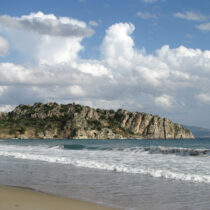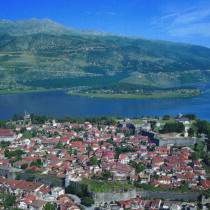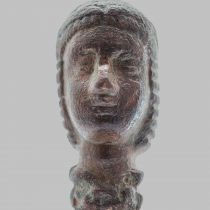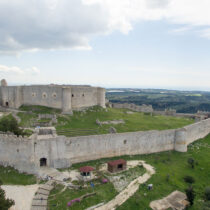Almost 2000 Fatimid gold coins found in Caesarea
The largest treasure of gold coins ever discovered in Israel was found in recent weeks on the seabed in the ancient harbor of the Caesarea National Park.
Prehistoric cult sites discovered in Negev Desert
Archaeologists discovered prehistoric 'cult sites' with phalic structures in the Eilat Moutnains, in the Negev Desert, Israel.
Ritual and ceremonies at the Mycenaean cemetery at Dendra
Presentation focusing on the ritual practices connected with the burials at the Late Bronze Age cemetery at Dendra in the Argolid in Greece.
2015 International Symposium on Culture, Arts, and Literature
Submission of abstracts until May 15, 2015.
Athos: Colors of faith
It took 25 visits to the Greek Monastic State and two hundred days of photographing to feature a modern version of the landscape and the people in this unique place.
Charred grapes of the Negev wine found
The charred seeds, over 1,500 years-old, were found at the Halutza excavation site in the Negev during a joint dig by the University of Haifa and the Israel Antiquities Authority.
The Mycenaean Age and its endurance at ancient Eleon in Boeotia
Brendan Burke and Bryan Burns will address the topic “The Mycenaean Age and its endurance at ancient Eleon in Boeotia” on February 20, 2015 (7.00 p.m.) at the Swedish Institute at Athens (Mitseon 9, Athens).
Turkey prepares for its own Archaeological Institute
Turkey is set to establish its own Archaeological Institute. "Finally," Turkish media report, as the country has "already witnessed the establishment of German, Austrian, American, French, British, Japanese and Dutch archaeological institutes on its soil."
Islamic coins in Viking grave
A Viking Age grave in Skaun south of Trondheim in Central Norway containing a sword and a shield boss. Most surprisingly the shield also revealed some Islamic coins hidden in a leather bag.
15th Annual Joint Postgraduate Symposium on Ancient Drama
The 15th Annual APGRD / University of London Joint Postgraduate Symposium on the Performance of Ancient Drama will take place on Monday 29 June (at Royal Central School of Speech and Drama, London) and Tuesday 30 June (at the Ioannou Centre, Oxford).
Leventis PhD Studentship at Exeter
The Department of Classics and Ancient History at the University of Exeter is offering a doctoral studentship, generously funded by the A.G. Leventis Foundation.
An Italian cemetery may provide clues on cholera’s evolution
A team of archaeologists and other researchers hope that an ancient graveyard in Italy can yield clues about the deadly bacterium that causes cholera.
Larger area analysis needed to understand patterns in ancient prehistory
Archaeologists need to study larger areas of land and link those studies to measurable environmental, societal and demographic changes to understand variations in prehistoric societies, according to Penn State anthropologists.
Museums and Museology in modern society. New challenges, new relationships (Part 4)
The present article attempts to map the professional progress of museologists in Greece, tracing the factors that determined their training in museology, their professional development, and the mark each of them has made on museology today.
Archaeologists reveal mysteries of ‘lost’ 3,000-year-old civilisation
These discoveries, based on research from the Trans-Sahara Project, reveal that the sun-beaten and arid lands of the Sahara to have been a much more populous place than first thought.
Voices at Work: Women, Performance, and Labor in Ancient Greece
"Voices at Work" explores the complex relationships between ancient Greek poetry, the female poetic voice, and the practices and rituals surrounding women’s labor in the ancient world.
Video reveals potential ‘killer blow’ to King Richard III
Leicester University has revealed new film footage that for the first time details the potential killer blow that claimed the life of King Richard III.
Black Sea: Unity and Diversity in Roman Antiquity
The starting point of the BSUDRA Project is the identification of common cultural elements characterizing all regions surrounding the Black Sea.
Two skeletons in a tight embrace unearthed in Greece
Archaeologists in Greece have unearthed two skeletons locked in a tight embrace, among other finds, during excavations in the Diros Caves.
Divine Yet Human Epics: Reflections of Poetic Rulers from Ancient Greece and India
Shubha Pathak’s interpretative account concludes with a new way to connect Indian primary epics to their Greek analogues.
Noninvasive methods used in the study of historic Indian sword
Scientists and conservationists from Italy and the UK joined forces to study a curved single-edged sword called a shamsheer using classical and nondestructive techniques.
International Conference on the Ancient Novel 2015
ICAN V, the fifth international conference on the ancient novel and narrative is to be held in Houston, Texas, 30 September-4 October 2015, 39 years after the first ICAN in Bangor, Wales.
Power and Pathos: Bronze Sculpture of the Hellenistic World
The exhibition bring together approximately 50 ancient bronzes from the Mediterranean region and beyond ranging from the 4th century BC to the 1st century AD.
Traces of large-scale human-produced air pollution in Peruvian ice cap
Scientists have found the first detailed record of widespread human-produced air pollution in South America from before the industrial revolution...




























